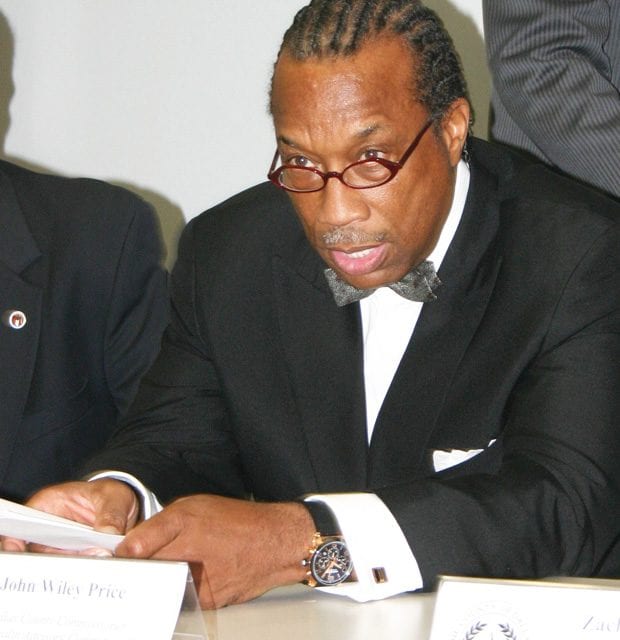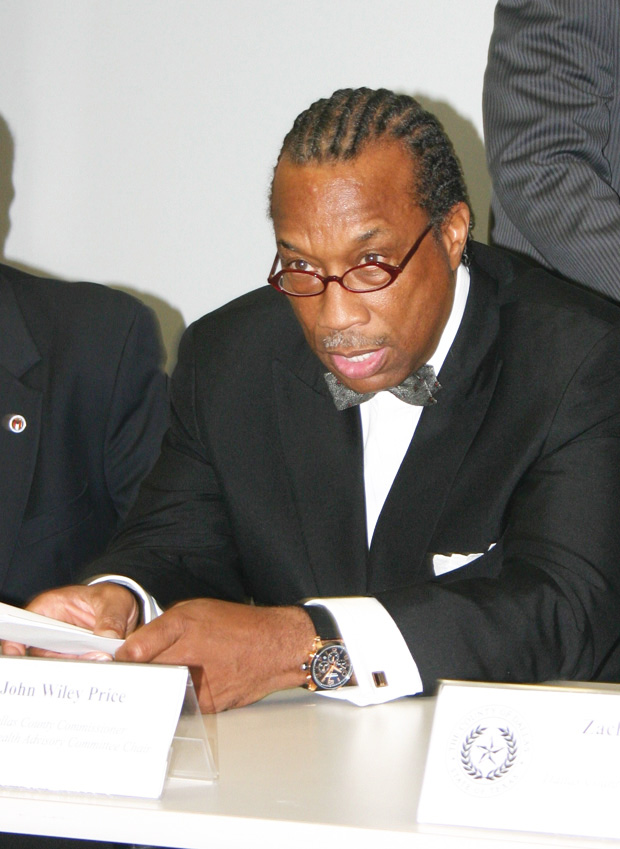For many years, John Wiley Price was the only advocate the LGBT community had on the Commissioners Court.
When Dallas County Commissioner Mike Cantrell introduced a resolution to remove Commissioner John Wiley Price from office at the court’s Tuesday, Aug. 26 meeting, the resolution died for lack of a second.
Commissioner Elba Garcia said she believes that was the proper outcome, because, she said, commissioners have no power to remove another commissioner from office.
Garcia said Cantrell’s resolution was just intended to score some political points for the court’s only Republican member, and if Cantrell really wanted to remove Price, he could have filed a petition with a district judge to begin the process.
While the resolution didn’t mention Gov. Rick Perry and his legal problems, Garcia explained her refusal to second as her belief that both Perry and Price are innocent until proven guilty.
Perry was booked on abuse of power charges on Aug. 19. Price was indicted on July 25 for conspiracy, mail fraud, theft of honest services and tax fraud. Both have pleaded not guilty.
Activist Louise Young said she hopes the LGBT community takes no pleasure in Price’s indictment, because the commissioner has been an ally over the years.
“No matter what the verdict turns out to be, Price was one of the first people in the political community to support us,” she said.
When county commissioners voted to add gender identity and expression to the county’s nondiscrimination policy, which already included sexual orientation, two Republicans opposed. Two Democrats — Commissioner Elba Garcia and County Judge Clay Jenkins — favored the addition, while Price was the last to indicate his support.
Each week, two or three members of the trans community appeared at Commissioners Court meetings to tell their stories.
Omar Narvaez, community educator for Lambda Legal, said members of the LGBT community met privately with Price as well, explaining the difference between sexual orientation and gender identity and why the addition was necessary.
Their efforts made the difference and Price voted in favor of the change.
“At the end of the day, it’s about doing the right thing,” Price said the day of the vote.
Narvaez said that’s the way Price operates.
“He’s a man who needs all the information before he makes a decision,” Narvaez said. “Once he’s with you, he makes sure the law is passed.”
He said Price has been passionate about defending LGBT issues and called him a staunch ally.
“[But] it’s the harsh and brazen Commissioner Price who makes the news,” Narvaez said.
Garcia noted that for years, Price was the only Democrat on the court, and as such, “He was the only voice for many communities” during those years.
“He’s been a champion for a lot of causes in his 29 years in office,” he added.
During the 1990s, Price was responsible for securing funding for a number of AIDS programs.
Resource Center began an insurance assistance program and spent about $40,000 the first year. Parkland hospital figured keeping those patients insured saved the county $3 million that year.
The next year, when the cost of the program was going to rise to about $60,000, Resource Center asked the county for help.
Initially, the four Republicans on the court opposed the funding. One referred to gay men with AIDS as “those kind of people.”
That’s when Price pointed his finger at his fellow commissioners and called them bigots who would rather squander millions in taxpayer money instead of helping people with AIDS that the commissioners automatically assumed were gay.
In the final tally, two of the commissioners voted with Price, while two others decided wasting $4-5 million was reasonable as long as they weren’t seen helping “those kind of people.”
More recently, when AIDS Drug Assistance Program funding was threatened, Price questioned Parkland officials at a Commissioners Court meeting about how much it would cost Dallas County to continue providing medication to area residents who lost federal drug assistance.
A panel of Parkland of officials sat stone-faced at the meeting that morning. His Democratic colleagues on the court left the questioning to Price.
As one official after another proved they had no clue what he was talking about, Price persisted until the last person at the table said he would look into the cost of providing those medications to the thousands of people receiving ADAP drug assistance in Dallas County if federal funding for ADAP were withdrawn.
Longtime activist Viv Armstrong said when the LGBT community in Dallas first began organizing politically, they created Project 80 to partner with the Democratic Party.
“To get people interested, the Oak Lawn Band and Turtle Creek Chorale performed,” Armstrong said.
She said just two Democratic leaders appeared at the first rally — Eddie Bernice Johnson and John Wiley Price. She called his support a breakthrough at the time.
Dallas Gay and Lesbian Alliance President Patti Fink called Price “a stellar advocate for our community,” although his methods are sometimes unorthodox.
“When I first moved here, he was in the news for whitewashing billboards selling alcohol and cigarettes in his community,”
Fink said. “I had immediate respect for him because he’s right. Companies spend billions on billboards because they work.”
She said Price has been creative about the way he’s made his points over time.
“He’s ruffled some feathers, but that’s how to get things done,” she said.
This article appeared in the Dallas Voice print edition August 29, 2014.












